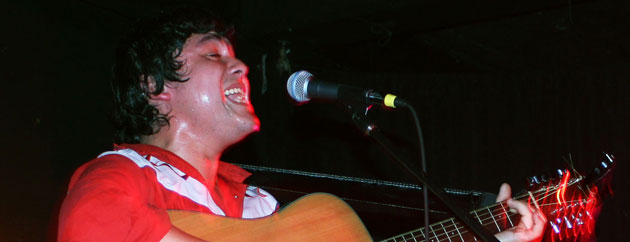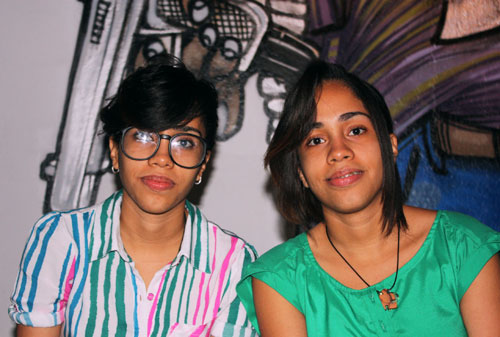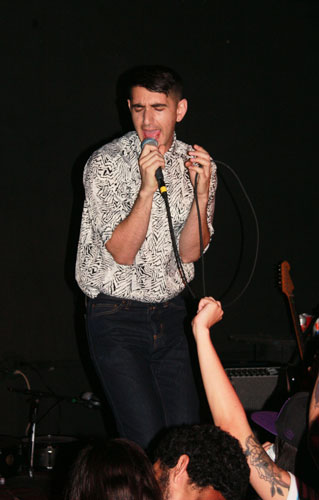
El Independiente: Bridging the Gap Between Latin America and the Caribbean’s Indie Scenes
30 September, 2012Nothing shatters preconceived notions of what it means to be a musician in Latin America faster than seeing artists from four different countries create a cultural exchange unlike any other on stage. In the neatly packaged world of the music market, no organiser in their right mind would put on the same bill: a Chilean pop prince, a Northern Mexican corrido singer, a Puerto Rican acoustic act, two Dominican songstresses and a completely “queer” performance band. Considering the size of the venue, the show was ambitious to the point of obnoxiousness. It could have failed, but the event managed to prove that there are more commonalities than differences between the indie music scenes of South America, North America and the Caribbean. Even further, it showed that united, these scenes can become a cultural force to be reckoned with.
The performers that night were the Dominican duo Las Acevedo, Puerto Rico’s Dax Díaz and Macha Colón Y Los Okapi; Mexico’s norteño folk raconteur Juan Cirerol, and Chile’s pop wonderkid Alex Anwandter. The show was the second installment of the aptly titled concert series El Independiente, organised at a venue in the heart of the San Juan metropolitan area by two blogs, Puerto Rico Indie and Mala Vida, Buena Música; and a public radio show, Frecuencias Alternas. These are the island’s only media dedicated to covering the Puerto Rican independent music scene and its Latin American counterpart.
“We have a strong desire to have a better communication between the Puerto Rican music scenes and the Latin American scenes. We felt there is a big gap between us and we strive to bridge it. So we work on various fronts: collaborating with blogs, distributing compilations, and now we are producing these shows to make these people meet each other and to give them a broader audience on the island,” explained Ezequiel Rodríguez, one of the organisers and founder of Frecuencias Alternas.
El Independiente began at midnight with the Dominican Republic’s twin sister band, Las Acevedo (pictured below). With a spotlight lighting their presence on stage, the sisters began with a simple setup: Anabel plays the bongos and Cristabel plays the guitar. And even though the sound was less than stellar during the set, Las Acevedo still managed to shine with the sweetest melodies and sing along choruses to grace the stage that morning.

Their sound wouldn’t be the first to come to mind when thinking about the Dominican Republic. While the typical fare is merengue and bachata, Las Acevedo’s particular folk pop (or picnic pop) is part of the newer generation of Dominican independent artists alongside Juango Dávalos and Diego Mena. The musicians explained that the scene is still growing, but that performers are constantly mixing typical rhythms with outside influences to create a sound of their own.
While the sisters have travelled far and wide with their music, when interviewed it is very easy to spot in them the hunger for unity and collaboration with other musicians in Latin America and the Caribbean. When asked what they thought the gathering could accomplish, Cristabel Acevedo explained: “For me it’s ideal to do these types of shows because it’s necessary to let yourself be known. That’s how the scene grows, when artists internationalise themselves and people here learn about what’s going on in our countries. We learn about what’s going on here.” Her sister Anabel, added “I think that […] what’s happening in all of Latin America is an awesome thing and that makes us want to create more.”
The show was organised as a give and take between the music scenes. After the Dominican Republic, it was Puerto Rico’s turn to showcase one of the few acoustic folk singers on the scene. His name is Dax Díaz, and while he has yet to release a record, he has been making the rounds across the island. His sound is lo-fi to the point of distortion, but his stage presence is commanding. His music – melancholic and hard edged – was quite a departure from the sweetness of Las Acevedo. But it did prepare the audience for something completely different: Mexican folk singer Juan Cirerol.
Cirerol (pictured at top of page) was the wild card of the night, as it would’ve been impossible to predict the audience’s reaction beforehand. Norteño folk is not one of those genres Puerto Rican audiences are accustomed to hearing. For most, the only reference to Northern Mexican music is the non-representative repertoire played on Univision’s famous morning shows. But as soon as Cirerol took the stage, the audience soaked up his energy and began to dance. Some, including myself, were awestruck by the Norteño with the boozy, raspy voice who played his guitar like Johnny Cash on steroids.
Dressed in a brick red cowboy shirt and grey slacks, Cirerol looked quite lonely on stage with his guitar, a harmonica and a couple of beers. But his first song “Se Vale Soñar”, an ode to a world were cocaine falls from the sky and the cartels are non-existent, won the audience over with its brutal honesty. He has the aura of an old school raconteur and, completely committed to the role, his set was one of the most emotionally raw performances of the night.
In fact, one of the uniting threads between all the performers was the realness they projected. None of their sets looked rehearsed to exhaustion. On the contrary, like a true independent venture, production mishaps forced the artists to interact in real time with the crew and the audience. Some made jokes, some were a bit more serious, but it was interesting to see how they managed to not get flustered and put on a great show regardless of the issues.
“We are very happy with the outcome; the audience was pretty rabid and ate up each music proposal. We were betting that, despite the musical differences, each project will win over the audience because of their honesty. All projects had that for us: sincerity on their proposal thus injecting their music with a contagious energy,” said Rodríguez.
The last two performers of the night, while different in their approaches, were quite similar in their intent. The first was Puerto Rican queer performance act Macha Colón Y Los Okapi. They are pretty alone in the scene, as there is no other band like them. Maybe that’s why their fans, which never stopped dancing front and centre, were so dedicated and so infected by Colón’s lack of self consciousness. Dressed in a sequined black dress, Colón and her band’s set was pure theatre full of comedy and unabashed sexuality.

At four in the morning Alex Anwandter (pictured above) took the stage by storm. The crowd had been waiting for him anxiously and they weren’t disappointed when Anwandter showed up with his computer and tore through Rebeldes almost in its entirety. As a performer, Anwandter is incredibly theatrical, but never false. In fact, the honesty and need for connection you hear on his latest record also translates on stage, specifically because the singer is not afraid to break the barrier between performer and audience. Anwandter spent most of his set dancing amongst the crowd; his facial expressions and his body movements conveying what we somehow already knew: he is making the music he would be listening and dancing to anyway. Even though the show ended at almost five in the morning, Anwandter left the crowd asking for a second encore.
More than creating a bridge between Puerto Rican artists and South and North American artists, these shows have the capacity to deconstruct the notions some might have about what is Latin American music. It is an easier selling point to lump the culture of a whole continent into a few neat categories than to explain the complexities and differences between the scenes of each country. Nevertheless, the cultural, musical and social exchange that went down at La Respuesta managed to, for at least one night, expose an audience to another side of Mexico, Chile, Dominican Republic, and even Puerto Rico. But more than that, the show also served as a meeting point for these artists and as a way to explore the commonalities between each scene.
Anwandter explained better the potential of these gatherings: “I guess it would be us all realising [that we have] a common identity through our language. Well, there’s more than that. I have obviously more things in common with people from Puerto Rico, cultural wise, than with people from the United States. It’s more similar; there’s nothing to do about it, you know? I do think it’s important to be aware and to create some sort of conscience about us [musicians] having an identity, of making music in Spanish; and that we are some sort of forceful thing to watch for.”
More information on El Independiente can be found at elindependiente.tumblr.com
All photos by Amaya Garcia
Follow Sounds and Colours: Facebook / Twitter / Instagram / Mixcloud / Soundcloud / Bandcamp
Subscribe to the Sounds and Colours Newsletter for regular updates, news and competitions bringing the best of Latin American culture direct to your Inbox.

